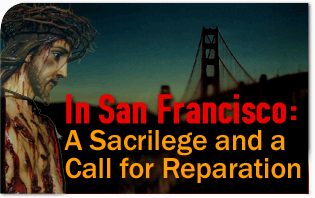 Weeks after pro-family web sites published photos and video footage of the sacrilegious scandal at Most Holy Redeemer Parish in San Francisco, the controversy still rages. The image of two transvestites dressed as nuns, receiving Holy Communion from the Archbishop’s hands (click here to see the disturbing video) has prompted calls not just for commentary, but also reparation.1
Weeks after pro-family web sites published photos and video footage of the sacrilegious scandal at Most Holy Redeemer Parish in San Francisco, the controversy still rages. The image of two transvestites dressed as nuns, receiving Holy Communion from the Archbishop’s hands (click here to see the disturbing video) has prompted calls not just for commentary, but also reparation.1
In response to the offense given to Our Lord in the Blessed Sacrament, the American Society for the Defense of Tradition, Family and Property (TFP) is asking members and supporters to join with thousands in a Holy Hour of Eucharistic adoration and reparation anytime between 5 and 8 p.m. local time on Friday, November 16, 2007 at churches and adoration chapels.2
The idea of a national reparation come just three weeks after over 2,000 Public Square Rosary Rallies were held nationwide. The TFP is asking its supporters and Rosary Captains to take an hour to make reparation for this terrible offense.3
On a practical level, many have reacted to the scandal. The Saint Joseph Men’s Association has sent a complete dossier (including the video) of the Sacrilegious Communion to the Holy See. Others have recommended that messages be sent to the Apostolic Nunciature and to the Vatican. Many have complained to the archdiocese prompting an apology from the Archbishop for lack of judgment.
However, the sacrilege itself remains without reparation. Making a Holy Hour of reparation before the Blessed Sacrament will allow Catholics nationwide to storm heaven with prayers asking for forgiveness.
The Church has always encouraged the faithful to pray in reparation. By His Passion and Death on the Cross, Jesus Christ made reparation to the offended majesty of God for the outrages which the Creator so constantly suffers at the hands of His creatures. Through the merits of Christ’s Death, the faithful are restored to grace and can thus make reparation to the justice of God for their own offences against Him. By virtue of the Communion of the Saints, they can also make satisfaction and reparation for the sins of others.
Objectively speaking, the act of giving Holy Communion to two men dressed as fake nuns with make-up and all the characteristics of members of the homosexual group Sisters of Perpetual Indulgence is a terrible sacrilege. As mentioned in an article on the TFP web site, “deliberate and notable irreverence towards the Holy Eucharist is reputed the worst of all sacrileges.”
Indeed, at Fatima, Our Lady herself spoke of such sacrileges and the need for reparation: “Do you want to offer yourselves to God to bear all the sufferings that He may wish to send you, in reparation for the sins with which He is offended and in supplication for the conversion of sinners?”
The Angel of Portugal at Fatima taught a beautiful prayer to the three children which especially mentioned the sin of sacrilege:
“Most Holy Trinity, Father, Son, Holy Spirit, I adore Thee profoundly and offer Thee the most precious Body, Blood, Soul and Divinity of Jesus Christ present in all the tabernacles on earth in reparation for the insults, sacrileges and indifference with which He is offended. And through the infinite merits of His Most Sacred Heart and the Immaculate Heart of Mary, I ask Thee for the conversion of poor sinners.”
In the same spirit of prayer and reparation as the 2,000 plus Public Square Rosary Rallies, the American TFP calls upon all to join with thousands of others in this crusade of prayers. If such a sacrilege occurs amidst general indifference, the nation may suffer the consequences of the Divine Majesty offended and suffer punishment. It may suffer the most terrible of all the punishments which is the retraction of graces.
Footnotes
- Cf. “Catholics want Vatican to clean church Holy Redeemer members tired of drag queen bingo, sexfests,” WorldNetDaily, Oct. 25, 2007, http://www.worldnetdaily.com/news/article.asp?ARTICLE_ID=58334
- T. Slater, “Reparation,” The Catholic Encyclopedia, http://www.newadvent.org/cathen/12775a.htm
- Joseph F. Delany, “Sacrilege,” The Catholic Encyclopedia, http://www.newadvent.org/cathen/13321a.htm (ours emphasis).

